When we travel as a family, we like to connect with the local culture to understand where we are and what makes- up the country and people. We connect through, food, exploration of a countryside or a city, markets and touring. With three full days in Siem Reap, Cambodia, our goal was to learn as much as possible.
We hired a guide, Thy Angkor Tour, learn more here, for our days in Cambodia, recommended by a friend. Thy, our guide was a treasure. By Western standards, the cost of a guide is quite reasonable in Cambodia per day and included an air-conditioned van. Thy was eager to tailor our experience. We explained that while we wanted to explore the splendor of Angkor Wat (and we did), we also wanted to get off the beaten path a bit. He set up an itinerary that had us going to a floating village on the Tonle Sap Lake.
Try to Visit the Less Frequented Villages
Thy arranged for us to see Mea Chhrey Floating village which, translated in English, means “The Mobile Floating Village.” Mea Chhrey is distinct from the typical four floating villages that foreigners most commonly visit. Some villages have become so overrun by tourists, that it’s become hard to get a real picture of what makes this life so unique. The day we visited, we were the only tourists in and around the village.
Thy drove about 50km outside of Siem Reap to a river bank that would lead us into the Tonle Sap Lake. As he negotiated with the driver of the boat, the kids ran around the dirt road, chasing after chickens and ducks who seemed to live wild in the area.
I noticed immediately, the amount of trash strewn all over the road, riverbanks, and throughout the bushes. Seeing this, I quickly recognized the lack of infrastructure and sanitation. We were heading to a village steeped in tradition yet one that is plagued in poverty.
We climbed into a wooden boat, powered by a tractor engine, and sat on the wooden bench seats. Our boat headed up-river to the Tonle Sap Lake. Floating homes of wood and tin appeared as the lake widened. We watched people working on their homes and women selling goods and produce directly from their boats. They would stop for a chat and a drink while conducting their business. Men and women alike pulling in fishing nets from their boats, most likely from the night before. Our children watched as Cambodian kids younger than they, piled on a boat and started rowing to school on their own.
Understanding Life On The Water
Our guide explained that for years the lake has been their source of income. People live off of what the lake provides, fish, frogs and eels. However, due to over-fishing, the government has cracked down and now many villagers either fish illegally or now raise crocodiles as a source of supplemental income.
He explained that most of the electricity at the homes runs off battery power and there isn’t proper sanitation. The water used for drinking and bathing is the same water where trash, human and animal waste goes. It was a sobering reality check into this style of life.
Our boat stopped at one of the floating stores. We hopped out bought remarkably cold sodas and had a closer look into how the villagers lived. We were shown the inside of one of the homes, very basic in furnishing with an old television running off battery power. Underneath the frame of the house, which is on stilts, were crocodile pens, and a cage of fowl floating on empty gas barrels. A woman floated up on her wooden canoe filled with vegetables for sale. It was good for our kids to see that not everyone gets in the car to go to the large market with mass-produced goods, and how some people rely on producing and selling their products.
Disappearing Way Of Life
We wanted our family to learn about this way of life and letting our kids see how people build communities around what supports them. In this case, it’s fishing. We hoped that they understood that this way of life is not easy and quickly disappearing.
If you chose to go visit a floating village in Cambodia, make sure to do your homework and that the proceeds of your visit are going to help sustain the village rather than the travel provider. Fishing created these villages. Unfortunately, they may now be losing their livelihood due to increased consumption and over-fishing. Travel has given our kids first-hand insight into the complexities of evolving economies.


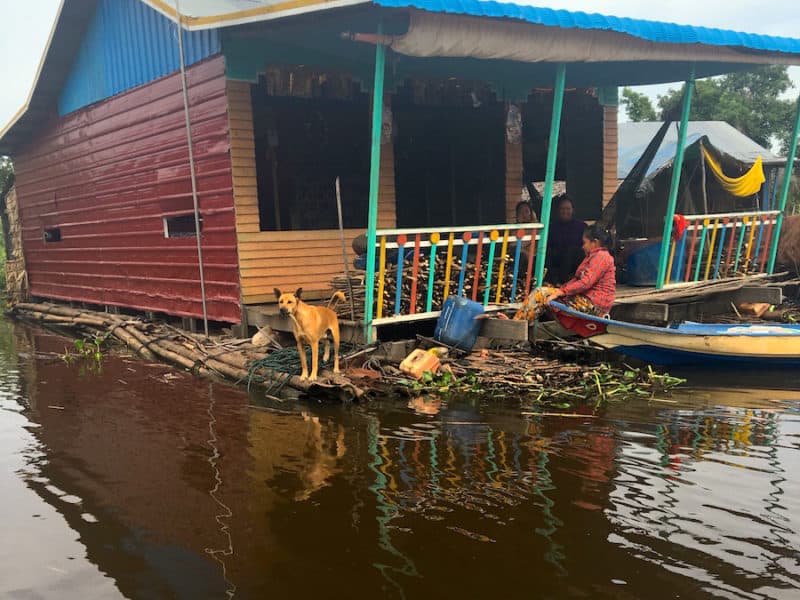
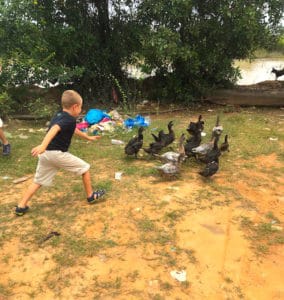
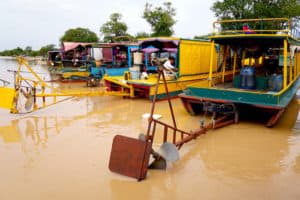
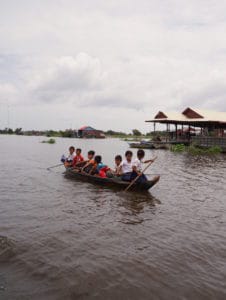
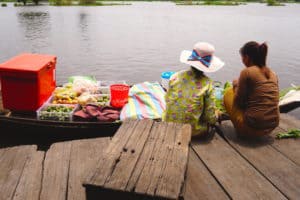
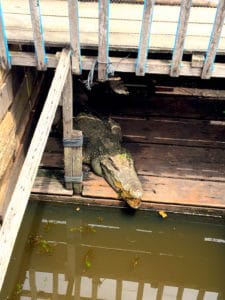
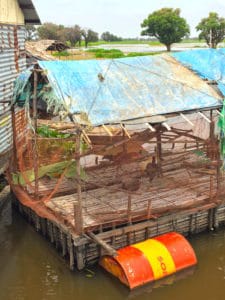
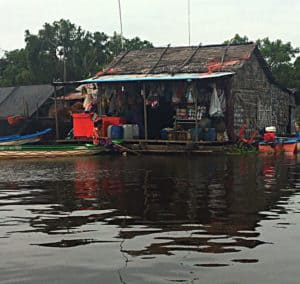
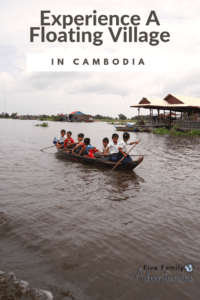
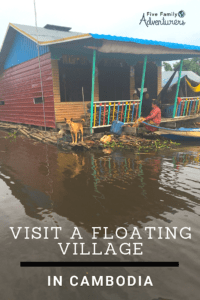
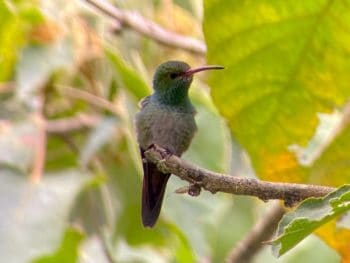
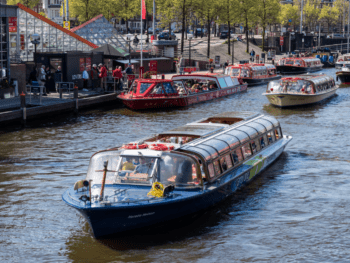
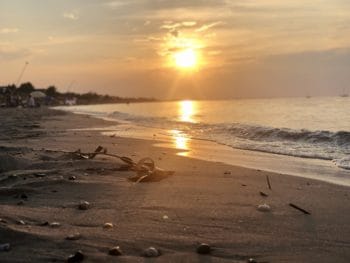
 Super Light Packing For Budget Airlines
Super Light Packing For Budget Airlines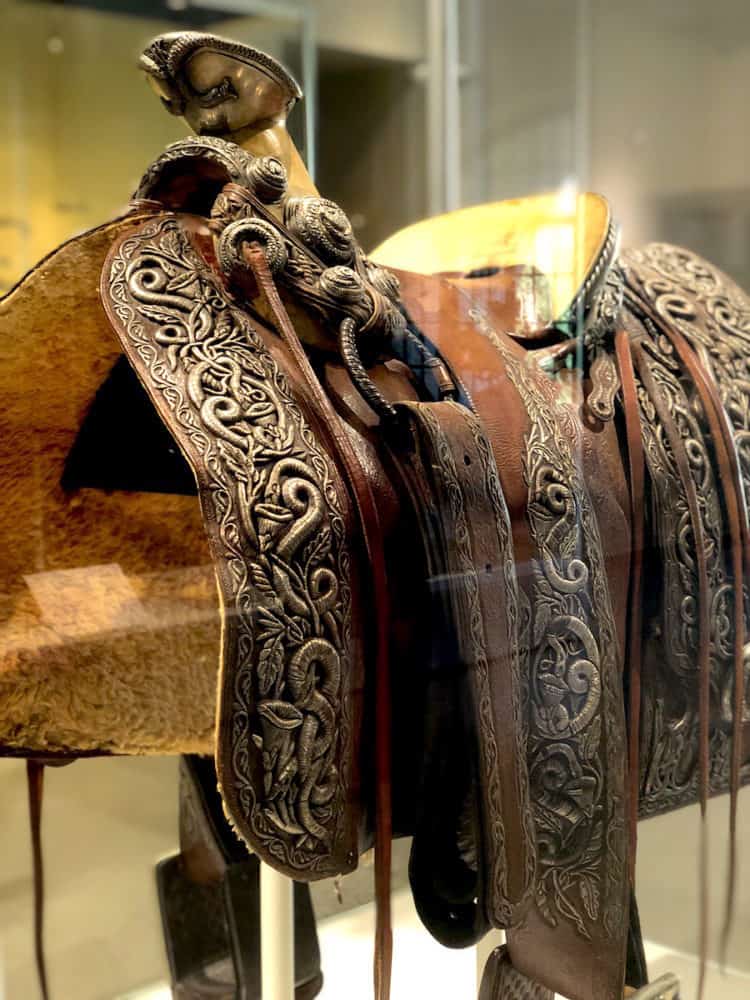
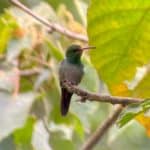
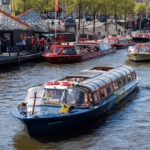






That is a different way of life. I am not sure I could handle the crocodiles in the bottom of the boat
such an exotic place! always loved the scenery there but most of all the heart warming locals! enjoy your travels!
A floating village?….um this sounds absolutely amazing!! I’d love to see this one day!!
I haven’t traveled to Cambodia, but this post made me really wanna visit the place! This is a great tour spot as well, full of culture to explore and learn. Might as well bookmark this so that I can have ideas of where to go next time! Yay! Thanks!
Wow this is really an interesting way to experience Cambodia. True authentic way of lives for some Cambodians so this would be nice if one could experience this while visiting.
I have been to Phnom penh, the capital of Cambodia many years ago and did a boat cruise too. But I didnt know there are so many stories behind these home such as using battery power to run. I didnt get to visit any of the home near the floating village but having an insight will be very good learning journey both for the adults and kids.
As i sit on my couch, laptop on my lap, warm blanket over my toes and im reading your post about a place that seems almost in another world, it makes me feel grateful for the luxuries we do have. It sounds like your aim was to open up this part of the world to your children. i thank you for doing the same for me.
Thanks Dani
They had these in Vietnam too – it completely blew my mind. I don’t think I could ever do it to be honest, but I admire the people who make this sort of living situation work.
What an amazing story! You are doing an amazing job teaching your children about all ways of life in all corners of the world!
This is fascinating! I love to learn about things like this and see how people around the world live.
That would definitely be cool to visit a floating village. That would be an adventure for sure and something different for me.
What an interesting and unique way to visit a country and learn about its customs and people. A great experience I imagine.
This looks like it would be such an amazing experience. I would absolutely love to visit this part of the world.
This was such an interesting post; not many have ever shared a true look to this way of life. I am intrigued by the crocodiles and definitely disturbed by the unsanitary conditions many in our world live in. What an amazing learning experience for your children!
This is quite an intriguing adventure. I’m just wondering if it is more difficult to live on water compared to living on land.
I’ve never heard of crocodile pens before. What were they raising the crocodiles for?
This is quite the experience that you and your family had exploring such a rustic village!
They are raising the crocs for income for their skins and meat, since they can no longer fish they way they used to.
I didn’t realize that about the water. Changes my perspective about wanting to travel there. I guess I’m getting too old for adventures I’d have tackled gladly in my youth. I love that you wrote about it. It is a place that intrigues me.
Never too old!
I have watched something like this over a documentary film and yes, the way of life they have are so different. I’d love to immerse with their lives and culture someday as part of my travel adventure.
What a cool experience, I’ve never been to anyplace like this.
What an amazing experience for your family! Thanks for the inspiration.
Wow, this is so adventurous. I am always interested to hear about people who can really get into the local e petite cR. Thank you so much for sharing!
What an invaluable experience for your kids! I love to do this kind of stuff. My husband, not so much. It is wonderful that you are writing about for people to see. I hate that they are losing their way of life. In a few years, it could all be gone.
What an eye-opening visit! I had not heard of these floating fishing villages until just last week when I caught a rerun of an Anthony Bourdain episode about the floating fishing villages in Vietnam. Such a gift you’ve given your children to be able to experience a culture like this first hand.
Anthony Bourdain introduced us to so much.
Wow that’s a unique way to visit Cambodia! It’s so sad how they live there :/
After my mission trip to Jamaica, and being immersed in the culture, I realized how it is such a life changing way to travel. It really puts life in perspective.
This is real eye opener as to how other parts of the world are. We take for granted what we have without realizing how little others have. I can’t imagine having to raise a crocodile or having to live in the floating village. What a great experience.
What an amazing learning opportunity for your children. Nothing beats witnessing it in real life, right in front of you.
Oh, wow. that was eye-opening. I agree with the person above who mentioned recognizing the luxuries we have here in this country. That must have been a fascinating trip and I can only imagine how much you learned that you have yet to share. Thanks for blogging your adventure.
I’ve heard of the floating villages in Vietnam but didn’t realise they had them in Cambodia too! Shame their livelihoods could be affected.
What a unique and interesting experience. Thank you for sharing Cambodia with us!
This sounds like such a humbling experience! I experienced the same during tour in DR.
I’ve never heard of a floating village before, really neat! House boats yes, but not a whole village!
What a very cool experience for your whole family.
I’ve seen these places so much on tv but never had anyone really go into detail on their way of life. Great read!
I have never been to Cambodia before but this village is a sight to see! It must have been a breathtaking experience to see how this village lives their everyday life. I would love to see it one day as well, thanks for sharing!
I’m intrigued by all of the floating villages around the world such as in Brunei, Vietnam, and now Cambodia. I’m curious what is a good solution to address the water issue since everyone uses the same water for daily usage. Thanks for sharing your insight.
This sounds like a great way to help others. A humbling experience. I wouldn’t mind doing something like this and taking my children along.